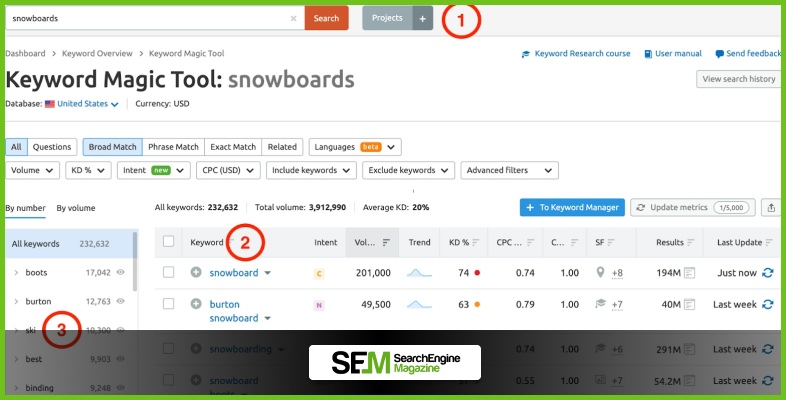Anna’s Archive: How Is It Revolutionizing Shadow E-Library?
Jul 17, 2025

Jul 17, 2025

Jul 15, 2025

Jul 12, 2025

Jul 12, 2025

Jul 12, 2025

Jul 10, 2025

Jul 07, 2025

Jul 07, 2025
Sorry, but nothing matched your search "". Please try again with some different keywords.


Creating content is not an easy task. It is a constant effort that you have to put in. And needless to say, there are times when you face writer’s block. No matter how hard you try, you just cannot come up with something really good or even decent. But what happens then?
Do you just stop writing? Do you stop making content just because your article is not adding any value to your audience? No. Just because you cannot add further additional value does not mean that all that you have written has to go to waste.
For times like those, you can make friends with the outbound links. Don’t know what they are and how they can help? You have found the right place. Read till the end to find out more about these links.
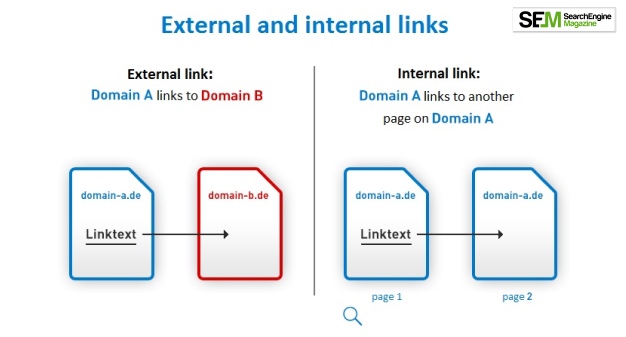
Before I take you to your actual search, there are a few things that you should know. Knowing these will only make it easier for you to understand the topic of this article. There are many types of links that are used in content and websites. The two most important types of links are:
The links that you use in your content to link the readers or audience to another article of the same domain or website are known as internal links. You are linking one page of your website to another page on the same website.
When you use internal linking methods, you make sure that your readers navigate from one article to another on your website. This increases the position of your website and also optimizes your site for search engines.
The links that you use to connect your website to another website that is completely different and not your own are known as external links. When you use external links, you connect your readers to another website that adds more content and information to your content.
There are two types of external links. They are:
In other words, what is an inbound link for you is an outbound link for someone else and vice versa.
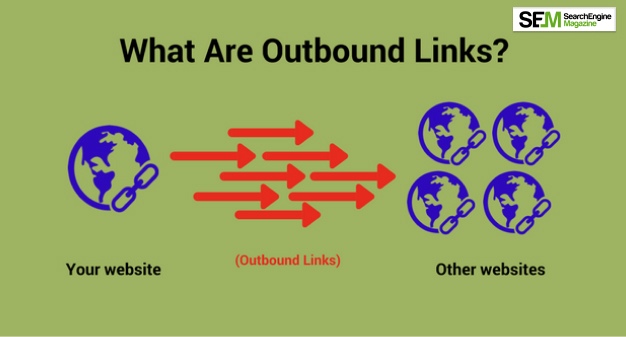
When you are out of ideas and fail to add further information or add value to your content and your audiences’ search, you can simply add another link that does the work. These are the outbound links.
The links that you add to your content that connect or link your readers to another website that is not your domain are known as outbound links.
In other words, the links from another website that you use in your content to point to another website to add more context to your content are called outbound links.
They are also known as ‘authority links.’ That is because the outbound links are used by a website that needs more information and backup.

There are many types of outbound links. Different types of outbound links have different functions to play. Two important types of outbound links are:
All the outbound links that you add to your website are do-follow or follow links. When you add these links, the search engines follow them. When this happens, the Google search engine takes these do-follow links as a vote of confidence.
This means that with the help of the do-follow links, the site that you are linking your content to will rise in the search engine ranking. It is fair to use do-follow links as they are more ethical. By doing this, you are giving credit to the site that you are linking to.
When you do not want to give credit to a different website, you change the do-follow links manually. When you do this, the Google search engine does not follow the link and does not reach the site where you are linking your content.
Even though this is not ethical, this makes sure that your links are not counted as votes. This means they do not end up helping those websites in their ranking.
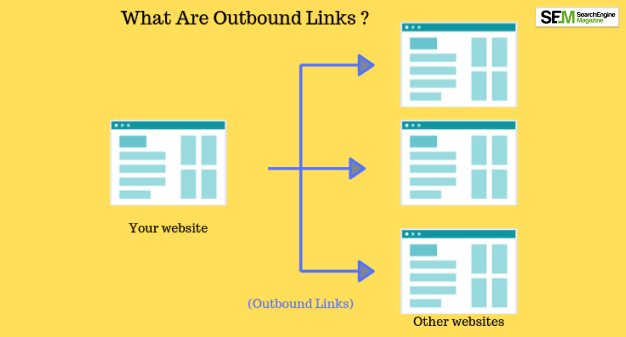
In case you thought about whether outbound links are helpful or not, you might be happy to know that these outbound links are helpful to your site. There are many advantages to using outbound links in your content. Some of them are:
When you use an outbound link to connect your content to another website, this makes the raiders think that your content and the information that you are providing are trustworthy. This helps them to trust your website.
When you add outbound links to your content, they act as a sign that you are adding further information to the content. This adds value to the search of the reader or user. When this happens, it helps your website earn more and more target audiences.
When you use outbound links that connect your content to another website, it automatically helps you build a healthy and professional relationship with the site that you are linking to. These are the goodwill relationships.
This helps in many ways. The website may turn out even more helpful in the future and you may end up asking experts from the shared industry to participate in your content.
One of the most important and the core of SEO strategy is to earn and build links. So there is hardly any doubt left that Outbound links are very helpful as they even improve the SEO (Search Engine Optimization) of the site. How does this happen?
When your outbound links connect to a higher authority site, the links help the search engines and help the Google algorithm view your site. Even though the outbound links are not as important as backlinks are, in the case of blogging, they do play a very important role.
There are many advantages of using outbound links in terms of a better SEO strategy. Some of the benefits are:
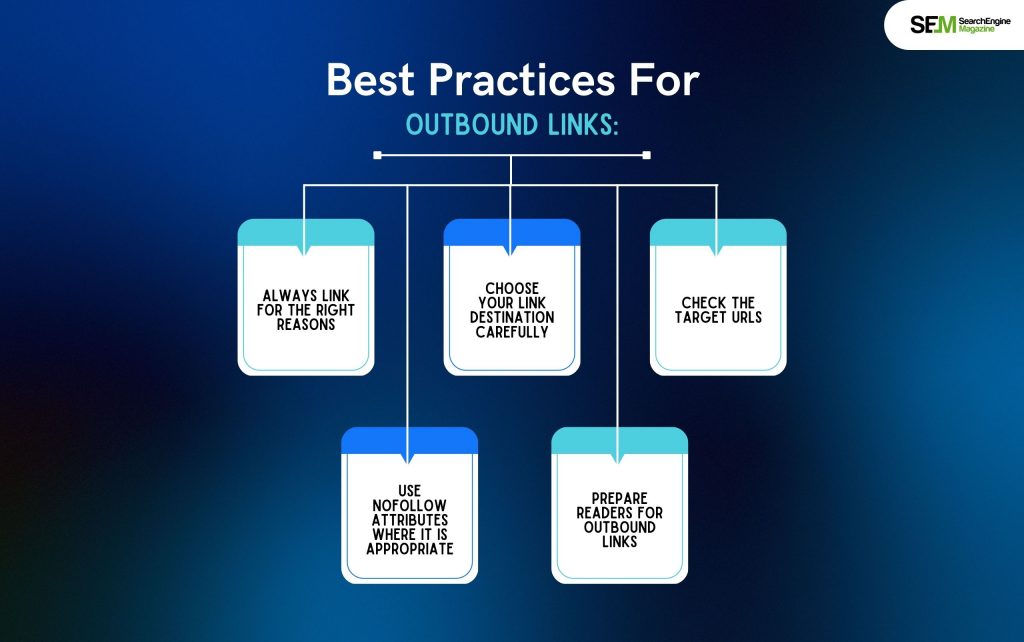
Follow these practices to make sure that the outbound links you are adding to your website are good for both SEO and your audience.
Typically, you can add outbound links for two reasons:
Moreover, you should avoid adding links to boost the linked website or your site’s SEO.
In general, you should not link to competing websites, that is, sites that compete in search or commercially with you.
Otherwise, you will end up introducing your readers to rival sites that might be better at retaining them than you.
Also, you can pass your ranking credit to the rival website or web page. And while doing so, you might end up helping them to outrank you.
When you are adding outbound links, you have to check whether the URL is working properly and is not redirecting since redirects tend to slow down things, confusing the readers in the process.
In addition, ensure that you are using the URL’s best version.
You have to use the nofollow attributes wherever they are a necessity. This is because you can risk violating the link spam guidelines of Google. Moreover, getting a penalty from Google can negatively impact your site’s overall SEO performance.
It appears to be spammy when a link takes a user to an external website without any warning. Moreover, it can make users frustrated and confused. So, it is always best to prepare your audience for outbound links – for instance, you can add links to comprehensive anchor texts.
Adding outbound links to your site is very unlikely to negatively impact your SEO. However, there is one exception: you cannot go against Google’s guidelines on link spamming.
Under this guideline, Google mentions how it treats certain outbound links like endorsements for some target pages. Now, these links can easily pass the ranking parameters that enhance the linked website’s SEO.
As a result, the practices mentioned below are known as manipulative and spammy:
So, if you add any outbound link for the benefit of the user, you are not going to breach any of Google’s guidelines. Think about it before adding them – after all, these links take away readers from your website.
There is a certain misconception about outbound links – how these links can dilute the ranking strength of your source page. FYI, it is measured by PageRank, an algorithm.
While it is true that outbound links from high-authority pages on the internet pass for more ranking credit to the linked pages as compared to the ones on low-authority pages.
For instance, links from CNN have more value as compared to a link from a new blog. But this does not happen because anything is getting transferred. In fact, it is Google that weighs such endorsements relatively more heavily since these come from relatively more credible sources.
Barsha is a seasoned digital marketing writer with a focus on SEO, content marketing, and conversion-driven copy. With 7 years of experience in crafting high-performing content for startups, agencies, and established brands, Barsha brings strategic insight and storytelling together to drive online growth. When not writing, Barsha spends time obsessing over conspiracy theories, the latest Google algorithm changes, and content trends.
View all Posts
Anna’s Archive: How Is It Revolutionizing S...
Jul 17, 2025
How To Optimize Images For SEO? Easy Steps To...
Jul 15, 2025
Quickwin: Your Gateway To Premium Online Ente...
Jul 12, 2025
Top 7 HVAC Marketing Mistakes That Are Tankin...
Jul 12, 2025
8 Top AI Market Research Tools For Fast And A...
Jul 12, 2025
